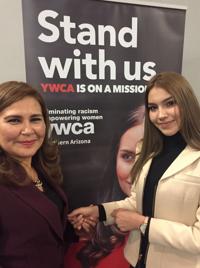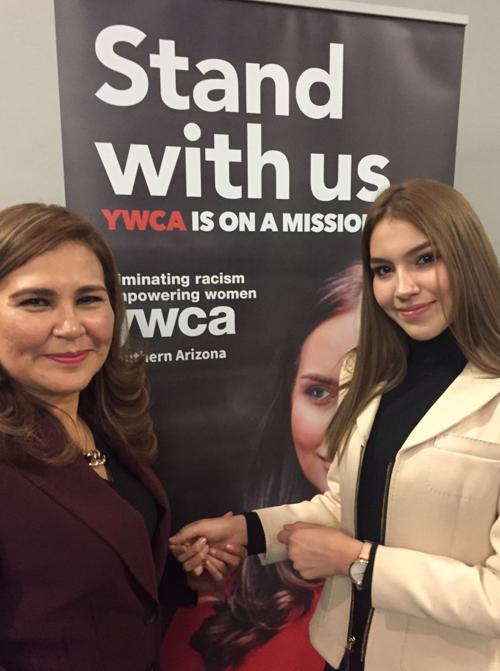Christmas came about a week early for about 70 immigrant Latinas.
They each received something, but not gifts — certainly not the kind you buy in a store or order online. The women worked for what was proudly handed to them: certificates of achievement.
The women, nearly all of whom were born in Mexico, had taken part in the Latina Leadership Institute offered through the Women’s Center for Economic Opportunity at the YWCA of Southern Arizona. On Saturday, Dec. 16, the women, most accompanied by family members, heard their names called out as they walked up to the front for an abrazo, a proud and happy hug.
“You are the heart of this organization,” Alba Jaramillo, director of the institute, told the women in her opening remarks. “You are the movement.”
The women all came to this country not knowing the language. They labored to find jobs and to hold their families together while attending the weekly sessions. Several of the women are undocumented, and some are victims of sexual abuse and domestic violence. They are all steadfast survivors.
They all have their individual stories and struggles, and they all shared a common road to personal and professional growth through the leadership program, which will empower them to bring positive change to an immigrant community that has long been maligned.
“You are brave and you are leaders in the community,” Jaramillo said to the future role models at the YWCA, 525 N. Bonita Ave.
The weekly bilingual workshops dealt with diverse themes.
Some women, having completed several phases of the program, earned the titles of promotoras. They will counsel and support women who are victims of domestic violence. Another session dealt with personal growth and household money management. A third stream focused on professional development, including opening and owning a business. The institute also offered English as a Second Language classes and other women earned their GED high school equivalency diplomas through the Pima Community College Adult Education department.
Jaramillo wrote on her Facebook page after the ceremony that 96 percent of the program’s graduates in the past two years have found employment, opened or expanded their businesses, or returned to school for a GED or college education. In addition, the graduates have “created a true fellowship/mentoring program that creates space for other Latinas and immigrant women to leadership and to demand justice for our immigrant women in Arizona,” she wrote. The programs also emphasize worker and immigrant rights advocacy.
Some of the women have participated in several of the institute’s programs, each time moving up the ladder.
Marlen Espinoza, who received her GED diploma and has participated in several workshops over the past several years, urged her compañeras to take full advantage of the leadership programs.
“We cannot remain content with one step, one class,” she exhorted. “No, keep moving. Take the steps even if they are small ones.”
For Ana P. Valdez, a volunteer program leader for more than a year, the leadership program is critical to the women’s development in Tucson. It has also fomented her growth as a businesswoman and advocate for victims of domestic abuse.
“It is the most fulfilling thing I have done in my life,” she said days before the graduation event.
For the volunteer mentors, participation is their passion, their mission.
Imelda Esquer, a mother of two who studies at Pima Community College and serves as a mentor, said, “My salary is the liberation of women.”
The program has existed for nearly 10 years but has evolved in the past two years, said Jaramillo.
“There is a strong emphasis in mentorship and fellowship, and now leadership training and opportunities are part of each one of the classes,” she wrote in an email. “The programs are now peer led and taught by the women themselves.”
The confidence-building that the women came away with is immeasurable. It’s the foundation for accomplishing more, overcoming other obstacles, said Karina N. Orduño, another volunteer leader who has been with the program for four years. Her goal is to open a business and continue her education.
It’s not just adult women who are involved. The institute has a leadership component for young girls. Orduño’s daughter, Alin Rodriguez, a 17-year-old Flowing Wells High School senior, has been a participant and youth leader for three years in the mother/daughter and Y-Teens program.
To maintain the momentum, to ensure a stronger community and the development of new leaders, Jaramillo urged the graduates to recruit family members and friends to the new series of workshops, which begin Jan. 27.
This is where and how change begins.





